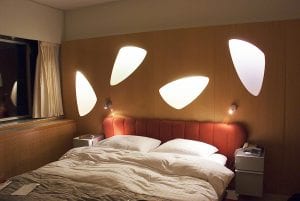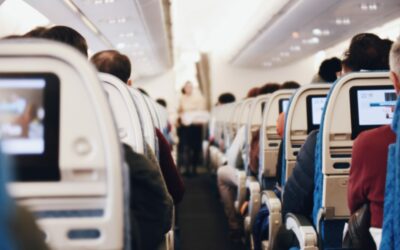Want hotel room safety?

Room at Copenhagen Radisson Blu Royal Hotel, Copyright © 2015 NSL Photography. All Rights Reserved.
An unmarried woman was traveling for work. At a Marriott, while she was sleeping, a male stranger came into her room. She assumed hotel room safety.
What’s crazy about the incident is it wasn’t a mistake. Apparently, a man went to the hotel’s front desk, claiming he was the woman’s husband and needed the key.
The hotel staff looked at the reservation and told him that he wasn’t registered. The staff said they needed to call the woman, but the man insisted that the woman should not be disturbed because she would be sleeping. The front desk gave him the key with no verification of his identity.
The woman says that she’s posted about the incident to warn others, to tell hotel guests to never forget to use their hotel room door’s deadbolt and chain, if any, so they don’t have to face the “sheer terror” she faced.
She’s right! She had the ability to prevent the invasion into her room.
Unfortunately, there’s too much news of safety and security problems for hotel guests. However, you can take practical actions to keep yourself safe in hotels.
- Whenever you’re in your hotel room, lock the door, including deadbolts, security chains, and swinging security locks. This adds to hotel room safety.
- I travel with a wedge doorstop alarm. It can prevent opening the door. The alarm is loud enough to wake me from a deep sleep and likely others on the floor. I believe it will scare away room intruders.
- After locking your door when you first get into your room, take a look at the peephole in your room door. If it doesn’t have a cover over it that you can slide away as needed, put adhesive tape or a band aid over the hole to block everyone from looking in at you. Many of the peepholes give a great view in both directions.
Stay at hotels that utilize restricted access as part of hotel room safety.
- I prefer hotels that require the use of room keys to call elevators that restrict guests to stopping only on their room’s floor. I also prefer hotels that have one-way stairwells. They allow you to leave the hotel in an emergency, but do not permit anyone to enter any floor from the stairs.
- Before unpacking, disinfect. I started doing this decades ago. Light switches, telephone keypads, doorknobs, toilet handles and TV remotes, etc., are typically not well cleaned by housekeepers between guest stays. As a result, they’re normally germ laden. After washing my hands, I use 70 percent alcohol-based antibacterial wipes that I’ve packed. I wash my hands whenever I return to my room.
- Soon after you’re settled into your room, take note of where your floor’s emergency exits are located. Don’t assume that you’ll be able to find them at the last minute. They may not be clearly identified and even if they are, in a fire, their location may be obscured by smoke.
 Don’t accept a room on the ground floor.
Don’t accept a room on the ground floor.
- A ground-floor room may be convenient, but these rooms are targets for thieves and others. If you’re staying at a motel with doors that open directly to the outside instead of a hallway, get a room that overlooks an interior courtyard, if there is one. I no longer stay at motels with doors that lead directly outside. They’re security nightmares for guests.
- Many safety experts suggest staying somewhere between the fourth and the sixth floors. Once you’re up to the fourth floor the rooms are high enough to be difficult to break into. Most fire department ladder trucks throughout the world are able to reach the windows on the sixth floor in case of fire or other emergency. It’s also easier to quickly walk down the fire tower stairs if you’re no higher than the sixth floor.
- If the personnel at the front desk announce my room number aloud when I’m picking up my key, I immediately ask for a new room assignment and explain why. You don’t know who’s in the lobby.
- Likewise, don’t announce your first name at check-in, if at all possible. Use your first name’s initial, or just use a title; Mr., Ms., Mrs., Dr. Reveal as little of your identity as possible in the hotel to make it harder for a thief to impersonate you to gain access to your room. Speak quietly when discussing the room.
Never tell strangers your name or mention your hotel name or room number.
- Whenever in public, in the hotel or elsewhere. You don’t want to let them pretend they’re a family member and use that to gain access to your room.
- Some hotels let guests check in on line, choose a room, set up their credit card to pay their bill and turn their smartphone into their room key, so guests never need to go to the front desk to check in. That’s a big security help as it eliminates problematic check-ins.
- If your hotel supplies door-hangers to put in food or cleaning requests, never put your name on the hangers.
- You don’t know if the inside of any drawers in your room were cleaned, so keep your belongings in your bags. Keep your bags off the floor for bedbug prevention. Bedbugs are attracted to the smell of dirty laundry, so store it in reusable plastic compression bags in your luggage.
- If your room windows open, check their locks when you get to your room after check-in. If they don’t work, get another room. If your room has a connecting door to the room next door, at the least, make sure it has a dead bolt lock that works. Better yet, get another room.
Use your “Do Not Disturb” sign to the extent possible.
- “Do Not Disturb” signs reduce the number of people going in and out of your room.
- If someone comes to your door unexpectedly, claiming to be a hotel employee, call the front desk to confirm it.
- Use your room safe for your valuables when not in your room, but before you use it, disinfect it.
- If any lights are out in the hallways or parking lot of your hotel, report it to hotel management and ask them to replace the lights immediately.
- Don’t leave your toothbrush out if housekeeping will be in your room. I’ve had readers tell me that they’ve come back to a clean room and found that housekeeping used their toothbrush to clean the bathroom.
Many hotels are making changes to improve guests’ security.
Some, to save money, are causing safety and security to back-slide. What hasn’t ever changed is that it’s always critical for travelers to take commonsense measures to keep themselves safe in their hotel. In the end, hotel safety is on each of us.

READ ALSO:
How to survive a long-haul flight — follow these rules
Misbehaving passengers this summer (or anytime) make traveling unpleasant
After many years working in corporate America as a chemical engineer, executive and eventually CFO of a multinational manufacturer, Ned founded a tech consulting company and later restarted NSL Photography, his photography business. Before entering the corporate world, Ned worked as a Public Health Engineer for the Philadelphia Department of Public Health. As a well known corporate, travel and wildlife photographer, Ned travels the world writing about travel and photography, as well as running photography workshops, seminars and photowalks. Visit Ned’s Photography Blog and Galleries.




